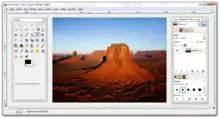Raster graphics editor
A raster graphics editor is a computer program that allows users to create and edit images interactively on the computer screen and save them in one of many raster graphics file formats (also known as bitmap images) such as JPEG, PNG, GIF.

Comparison to vector graphic editors
Vector graphics editors are often contrasted with raster graphics editors, yet their capabilities complement each other. The technical difference between vector and raster editors stem from the difference between vector and raster images. Vector graphics are created mathematically, using geometric formulas. Each element is created and manipulated numerically; essentially using Cartesian coordinates for the placement of key points, and then a mathematical algorithm to connect the dots and define the colors.
Raster images include digital photos. A raster image is made up of rows and columns of dots, called pixels, and is generally more photo-realistic. This is the standard form for digital cameras; whether it be a .raw file or .jpg file, the concept is the same. The image is represented pixel by pixel, like a microscopic jigsaw puzzle.
Vector editors tend to be better suited for graphic design, page layout, typography, logos, sharp-edged artistic illustrations, e.g., cartoons, clip art, complex geometric patterns, technical illustrations, diagramming and flowcharting.
Advanced raster editors, like GIMP and Adobe Photoshop, use vector methods (mathematics) for general layout and elements such as text, but are equipped to deal with raster images down to the pixel and often have special capabilities in doing so, such as brightness/contrast, and even adding "lighting" to a raster image or photograph.
Common features
- Select a region for editing
- Draw lines with simulated brushes of different color, size, shape and pressure
- Fill a region with a single color, gradient of colors, or a texture
- Select a color using different color models, e.g., RGB, HSV, or by using a color dropper
- Edit and convert between various color models.
- Add typed letters in various font styles
- Remove imperfections from photo images
- Composite editing using layers
- Apply filters for effects including sharpening and blurring
- Convert between various image file formats
See also
References
External links
 Media related to Bitmap graphics editors at Wikimedia Commons
Media related to Bitmap graphics editors at Wikimedia Commons